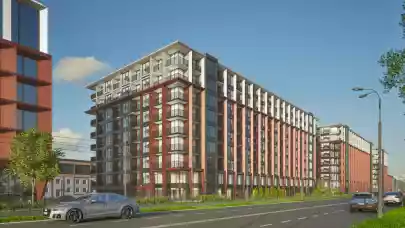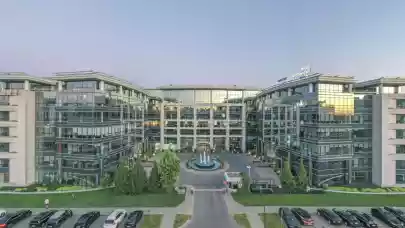
The resources of the PRS sector in Poland are growing. Last year, almost one in five apartments was built for institutional lease, which also had a significant impact on developers' results. According to Walter Herz, in 2021, investments in portfolios of residential for rent in Poland amounted to approximately €725 million. There are already almost 8,000 units on the Polish market offered in the PRS segment and other several tens of thousands of apartments under construction.
This year, the residential market entered the process of accelerated transformation. It happened due to, among others, the increase in interest rates and the amendment to the S recommendation of the Polish Financial Supervision Authority, which drastically reduced the credit scores of apartment buyers and seriously limited their share in the structure of developer sales.
On one hand, as the buyers are cut off from mortgages, the prospects for the rental market seem to be greater than ever before. On the other hand, however, investors talk about high uncertainty related to geopolitics and the conflict behind our eastern border, as well as rising inflation and costs of implementing and financing investments. Still, they are not withdrawing from the PRS market, but withholding decisions and watching as the situation develops.
More and more negotiations between funds and developers
At the beginning of this year, the offers of foreign funds that invest with us in the PRS sector and wanted to enter into cooperation with developers were often not very attractive for the companies. The reason was the very high demand from individual buyers and the higher margins that could be obtained from these sales. Now, when flats are selling much slower, the investors' offer gives developers the opportunity to maintain production, get revenues and obtain a faster return on capital. So they initiate contact with funds themselves. Today, however, they need deeper analysis and more time to make a decision.
It is because the expansion of portfolios of apartments for rent in Poland is possible only through contracting premises in buildings that are yet to be built. Meanwhile, the number of launched construction projects started to drop. Companies suspend new projects because they have great difficulty planning investment budgets.
“In the current situation, funds investing in the PRS sector in portfolios of real estate for rent may turn out to be a great support for the primary housing market in our country. Expanding cooperation with them is currently an optimal solution for real estate development companies, allowing them to develop their business, even at the cost of a lower margin,” says Katarzyna Tencza, Associate Director, Investment & Hospitality at Walter Herz. “Many residential real estate developers and even the companies operating in the commercial sector, such as Cavatina, plan to enter the PRS market. The sector is fragmented, some companies are willing to negotiate with funds, and some are waiting for the situation to stabilize. However, investors’ interest is still very high. This is evidenced, for example, by the recently concluded large investment transactions, as well as Hines and Kajima companies announcing to enter our PRS market. They are planning their first investments in the second half of this year,” adds Katarzyna Tencza.
New provisions in the contracts
Katarzyna Tencza claims that the funds are now even starting to return to the analysis of projects for which negotiations were previously suspended. Various models of cooperation are discussed, which is related to sharing of the investment risk. “High inflation makes it difficult to estimate the costs of project implementation and financing in the next few years, and thus to maintain an optimal return on investment. So far, in the case of most contracts, funds have preferred fixed prices of the ordered apartments and did not participate in the risk of rising costs. Currently, in order to be able to define the price more precisely, first of all, it is necessary to postpone the talks until receiving the building permit for the project. Moreover, the parties consider the introduction of indexation clauses to investment agreements. In this way, developers want to protect themselves against rising prices of building materials and workmanship,” notes Katarzyna Tencza.
The rising interest rates are creating an incredible opportunity for our rental market today. We are observing an unprecedented demand for renting apartments, also generated by the influx of refugees from Ukraine, as well as Belarus and Russia. There is a great interest in renting from companies transferring their employees to our country along with their families, for whom they provide accommodation. This means that even premises with longer delivery dates offered in institutional rent are contracted at an express pace, unopposed to charging fees in euros.
This form of lease is more convenient for companies than renting from individual owners. As part of the subscription, the tenant may require a specific standard of the apartment, a transparent contract, quick service in case something breaks down, and a package including, among others, Internet, equipment, a rent management app and a dedicated account manager, or the possibility of changing the premises altogether.
Bigger opportunities for the development of the PRS sector
Experts expect a further increase in rental rates in Poland, which gives even greater prospects for the development of the PRS sector. Especially because real estate in our country is still very well priced compared to the Western markets. According to Walter Herz, capitalization rates in the PRS sector for prime properties in Warsaw this year amounted to 4.70 per cent.
“The change in investment directions on the real estate market is also associated with the expansion of the Walter Herz Land Development department, which is dedicated to servicing new projects. We offer services to developers and investors operating also in the residential segment. We conduct analysis, secure the land and prepare it for development. We provide project support from the formal, technical and administrative side, including obtaining building permits, zoning approval and environmental permits,” says Katarzyna Tencza.
The number of building permits issued remains high on our market. However, we will see soon how many of them will actually be used. Developers will probably strongly adapt the new offer to the market needs and design flats differently. Compact premises that provide a relatively large number of rooms in a small area are becoming popular again.
There is also an opportunity for developers related to transforming real estate functions. Hence, the assumptions of the project have been prepared, enabling the changes in the functions of the real estate and the conversion of office and commercial buildings into residential buildings, which is to help increase the number of housing. This may prove to be significant facilitation for investors because thanks to the act it will be possible to use land with poorly performing office buildings and large-scale shopping centres in residential estates. The probability of implementing this type of investment increases, if we take into account the relatively low risk of cost estimation in such projects.
In the near future, we will also find out what market interest will be generated with the government program ‘Apartment without the downpayment’. Everything will depend on whether it will enable individuals, who do not have savings for the downpayment, to take out a low–interest loan. The developers believe, however, that the program's impact on the market will be negligible for many reasons.



